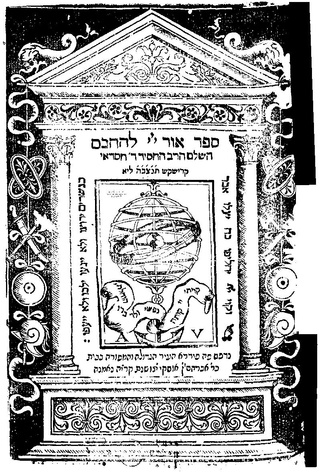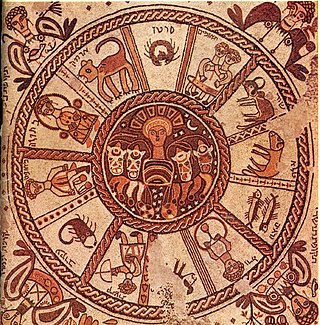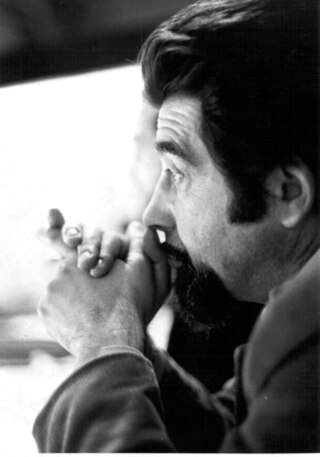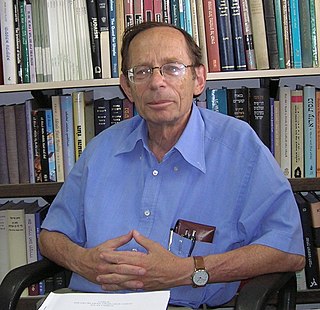
Abraham Joshua Heschel was a Polish-American rabbi and one of the leading Jewish theologians and Jewish philosophers of the 20th century. Heschel, a professor of Jewish mysticism at the Jewish Theological Seminary of America, authored a number of widely read books on Jewish philosophy and was a leader in the civil rights movement.

Moses ben Maimon (1138–1204), commonly known as Maimonides and also referred to by the acronym Rambam, was a Sephardic Jewish philosopher who became one of the most prolific and influential Torah scholars of the Middle Ages. In his time, he was also a preeminent astronomer and physician, serving as the personal physician of Saladin. Born in Córdoba, Almoravid Empire, on Passover eve, 1138, he worked as a rabbi, physician and philosopher in Morocco and Egypt. He died in Egypt on 12 December 1204, his body was transported to the lower Galilee and was eventually buried in Tiberias.

In Judaism, the Seven Laws of Noah, otherwise referred to as the Noahide Laws or the Noachian Laws, are a set of universal moral laws which, according to the Talmud, were given by God as a covenant with Noah and with the "sons of Noah"—that is, all of humanity.

There is no established formulation of principles of faith that are recognized by all branches of Judaism. Central authority in Judaism is not vested in any one person or group - although the Sanhedrin, the supreme Jewish religious court, would fulfill this role if it were re-established - but rather in Judaism's sacred writings, laws, and traditions.
Levi ben Gershon, better known by his Graecized name as Gersonides, or by his Latinized name Magister Leo Hebraeus, or in Hebrew by the abbreviation of first letters as RaLBaG, was a medieval French Jewish philosopher, Talmudist, mathematician, physician and astronomer/astrologer. He was born at Bagnols in Languedoc, France. According to Abraham Zacuto and others, he was the son of Gerson ben Solomon Catalan.

Moses ben Nachman, commonly known as Nachmanides, and also referred to by the acronym Ramban and by the contemporary nickname Bonastruc ça Porta, was a leading medieval Jewish scholar, Sephardic rabbi, philosopher, physician, kabbalist, and biblical commentator. He was raised, studied, and lived for most of his life in Girona, Catalonia. He is also considered to be an important figure in the re-establishment of the Jewish community in Jerusalem following its destruction by the Crusaders in 1099.
According to Jewish tradition, the Torah contains 613 commandments.

Jewish philosophy includes all philosophy carried out by Jews, or in relation to the religion of Judaism. Until modern Haskalah and Jewish emancipation, Jewish philosophy was preoccupied with attempts to reconcile coherent new ideas into the tradition of Rabbinic Judaism, thus organizing emergent ideas that are not necessarily Jewish into a uniquely Jewish scholastic framework and world-view. With their acceptance into modern society, Jews with secular educations embraced or developed entirely new philosophies to meet the demands of the world in which they now found themselves.

The Mishneh Torah, also known as Sefer Yad ha-Hazaka, is a code of Rabbinic Jewish religious law (halakha) authored by Maimonides. The Mishneh Torah was compiled between 1170 and 1180 CE, while Maimonides was living in Egypt, and is regarded as Maimonides' magnum opus. Accordingly, later sources simply refer to the work as "Maimon", "Maimonides", or "RaMBaM", although Maimonides composed other works.
Ger toshav is a halakhic term used in Judaism to designate the legal status of a Gentile (non-Jew) living in the Land of Israel who does not want to convert to Judaism but agrees to observe the Seven Laws of Noah, a set of imperatives which, according to the Talmud, were given by God as a binding set of universal moral laws for the "sons of Noah"—that is, all of humanity. A ger toshav, especially one who decides to follow the Noahic covenant out of religious belief rather than ethical reasoning, is commonly deemed a "Righteous Gentile", and is assured of a place in the World to Come .

Or Adonai, The Light of the Lord, is the primary work of Rabbi Hasdai Crescas, a Jewish philosopher. As some Jews prefer to not use even the respectful title Adonai (Lord) other than in prayer, the book is sometimes called Or Hashem in verbal usage to avoid mentioning even this title of God directly.

Isaac ben Judah Abarbanel, commonly referred to as Abarbanel, also spelled Abravanel, Avravanel, or Abrabanel, was a Portuguese Jewish statesman, philosopher, Bible commentator, and financier.

Astrology has been a topic of debate among Jews for over 2000 years. While not a Jewish practice or teaching as such, astrology made its way into Jewish thought, as can be seen in the many references to it in the Talmud. Astrological statements became accepted and worthy of debate and discussion by Torah scholars. Opinions varied: some rabbis rejected the validity of astrology; others accepted its validity but forbid practicing it; still others thought its practice to be meaningful and permitted. In modern times, as science has rejected the validity of astrology, many Jewish thinkers have similarly rejected it; though some continue to defend the pro-astrology views that were common among pre-modern Jews.

Noahidism or Noachidism is a monotheistic Jewish religious movement based upon the Seven Laws of Noah and their traditional interpretations within Orthodox Judaism. According to the Jewish law, non-Jews (Goyim) are not obligated to convert to Judaism, but they are required to observe the Seven Laws of Noah to be assured of a place in the World to Come, the final reward of the righteous. The penalty for violating any of the Noahide laws is discussed in the Talmud, but in practical terms it is subject to the working legal system which is established by the society at large. Those who subscribe to the observance of the Noahic Covenant are referred to as Bnei Noach or Noahides. The modern Noahide movement was founded in the 1990s by Orthodox rabbis from Israel, mainly tied to Chabad-Lubavitch and religious Zionist organizations, including The Temple Institute.

Moshe Halbertal is an Israeli philosopher, professor, and writer, a noted expert on Maimonides, and co-author of the Israeli Army Code of Ethics. He currently holds positions as the John and Golda Cohen Professor of Jewish Thought and Philosophy at the Hebrew University of Jerusalem and Gruss Professor of Law at NYU School of Law. In 2021 he was elected to the American Philosophical Society.
The Three Oaths is the popular name for a midrash found in the Talmud, which relates that God adjured three oaths upon the world. Two of the oaths pertain to the Jewish people, and one of the oaths pertains to the other nations of the world. The Jews for their part were sworn not to forcefully reclaim the Land of Israel and not to rebel against the other nations, and the other nations in their turn were sworn not to subjugate the Jews excessively.

Steven S. Schwarzschild (1924–1989) was a rabbi, philosopher, theologian, and editor.

Gerald Blidstein was professor emeritus of Jewish Philosophy at Israel's Ben-Gurion University of the Negev. He was the Israel Prize laureate in Jewish philosophy (2006) and had been a member of the Israel Academy of Sciences since 2007.

Daniel Judah Lasker is an American-born Israeli scholar of Jewish philosophy. As of 2017, he is Professor Emeritus in the Department of Jewish thought at Ben Gurion University of the Negev.











